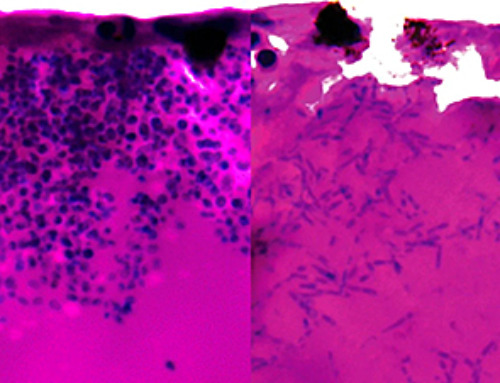MSU researcher is studying, raising awareness about the role of sex in the efficacy of vaccines that make use of nanomedicine
If there’s one take-home message for the general public about the coronavirus vaccines approved in the U.S., it’s that they are remarkably effective.
But Michigan State University’s Morteza Mahmoudi is raising awareness about an important subtlety: The vaccines developed by Moderna and Pfizer-BioNTech appear to work slightly better for males than for females.
Both vaccines use tiny orbs, or nanoparticles, to deliver their active ingredients to cells in our immune systems. For years, Mahmoudi has been studying how and why nanomedicines — therapies that use nanoparticles — can affect patients differently based on their sex and he believes this could be a factor with the vaccines.
The Johnson & Johnson vaccine has also drawn attention to sex differences because its rare blood-clotting side effect has affected predominantly female recipients. The J&J vaccine, however, uses modified adenoviruses rather than nanoparticles to help teach our immune systems to fight off the coronavirus. That said, Mahmoudi has shown in earlier work that viruses can transfect the cells of males and females differently.
Now, he’s focusing on the nanomedicine component. He’s published three peer-reviewed papers calling attention to the role of sex in nanomedicine studies, both in general and as they relate to coronavirus vaccines.
“We need to monitor these sex differences and report them to the scientific community and the public,” said Mahmoudi, an assistant professor in the Department of Radiology and the Precision Health Program. “It can be very helpful in developing future strategies and as we prepare for future threats.”
To develop those future strategies, researchers must better understand what causes patients of different sexes to respond differently to nanomedicines, Mahmoudi said. To that end, Mahmoudi is advocating for systemic changes in how nanoparticles are used and studied in medicine with an article published May 20 in the journal Nature Communications.
In the article, he outlines four large challenges in researching the role of sex in nanomedicine performance along with strategies to mitigate them moving forward.
News
Scientists Unlock a New Way to Hear the Brain’s Hidden Language
Scientists can finally hear the brain’s quietest messages—unlocking the hidden code behind how neurons think, decide, and remember. Scientists have created a new protein that can capture the incoming chemical signals received by brain [...]
Does being infected or vaccinated first influence COVID-19 immunity?
A new study analyzing the immune response to COVID-19 in a Catalan cohort of health workers sheds light on an important question: does it matter whether a person was first infected or first vaccinated? [...]
We May Never Know if AI Is Conscious, Says Cambridge Philosopher
As claims about conscious AI grow louder, a Cambridge philosopher argues that we lack the evidence to know whether machines can truly be conscious, let alone morally significant. A philosopher at the University of [...]
AI Helped Scientists Stop a Virus With One Tiny Change
Using AI, researchers identified one tiny molecular interaction that viruses need to infect cells. Disrupting it stopped the virus before infection could begin. Washington State University scientists have uncovered a method to interfere with a key [...]
Deadly Hospital Fungus May Finally Have a Weakness
A deadly, drug-resistant hospital fungus may finally have a weakness—and scientists think they’ve found it. Researchers have identified a genetic process that could open the door to new treatments for a dangerous fungal infection [...]
Fever-Proof Bird Flu Variant Could Fuel the Next Pandemic
Bird flu viruses present a significant risk to humans because they can continue replicating at temperatures higher than a typical fever. Fever is one of the body’s main tools for slowing or stopping viral [...]
What could the future of nanoscience look like?
Society has a lot to thank for nanoscience. From improved health monitoring to reducing the size of electronics, scientists’ ability to delve deeper and better understand chemistry at the nanoscale has opened up numerous [...]
Scientists Melt Cancer’s Hidden “Power Hubs” and Stop Tumor Growth
Researchers discovered that in a rare kidney cancer, RNA builds droplet-like hubs that act as growth control centers inside tumor cells. By engineering a molecular switch to dissolve these hubs, they were able to halt cancer [...]
Platelet-inspired nanoparticles could improve treatment of inflammatory diseases
Scientists have developed platelet-inspired nanoparticles that deliver anti-inflammatory drugs directly to brain-computer interface implants, doubling their effectiveness. Scientists have found a way to improve the performance of brain-computer interface (BCI) electrodes by delivering anti-inflammatory drugs directly [...]
After 150 years, a new chapter in cancer therapy is finally beginning
For decades, researchers have been looking for ways to destroy cancer cells in a targeted manner without further weakening the body. But for many patients whose immune system is severely impaired by chemotherapy or radiation, [...]
Older chemical libraries show promise for fighting resistant strains of COVID-19 virus
SARS‑CoV‑2, the virus that causes COVID-19, continues to mutate, with some newer strains becoming less responsive to current antiviral treatments like Paxlovid. Now, University of California San Diego scientists and an international team of [...]
Lower doses of immunotherapy for skin cancer give better results, study suggests
According to a new study, lower doses of approved immunotherapy for malignant melanoma can give better results against tumors, while reducing side effects. This is reported by researchers at Karolinska Institutet in the Journal of the National [...]
Researchers highlight five pathways through which microplastics can harm the brain
Microplastics could be fueling neurodegenerative diseases like Alzheimer's and Parkinson's, with a new study highlighting five ways microplastics can trigger inflammation and damage in the brain. More than 57 million people live with dementia, [...]
Tiny Metal Nanodots Obliterate Cancer Cells While Largely Sparing Healthy Tissue
Scientists have developed tiny metal-oxide particles that push cancer cells past their stress limits while sparing healthy tissue. An international team led by RMIT University has developed tiny particles called nanodots, crafted from a metallic compound, [...]
Gold Nanoclusters Could Supercharge Quantum Computers
Researchers found that gold “super atoms” can behave like the atoms in top-tier quantum systems—only far easier to scale. These tiny clusters can be customized at the molecular level, offering a powerful, tunable foundation [...]
A single shot of HPV vaccine may be enough to fight cervical cancer, study finds
WASHINGTON -- A single HPV vaccination appears just as effective as two doses at preventing the viral infection that causes cervical cancer, researchers reported Wednesday. HPV, or human papillomavirus, is very common and spread [...]






















